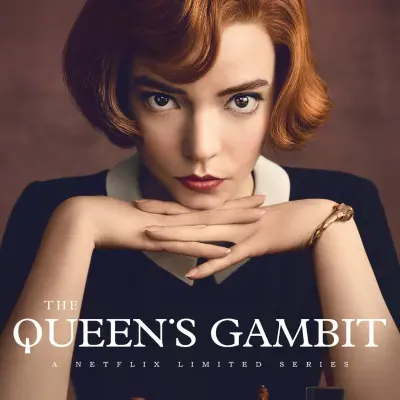The Queen's Gambit allows Anya Taylor-Joy to play every alluring male character in the history of cinema
-

Taylor-Joy's Beth Harmon is the rare screen portrayal of a woman who is completely in charge of her sexuality, says Jude Dry. "Beth is a mad genius, a tortured drunk, and a consummate seductress. In short, she’s every alluring male character in the history of cinema," says Dry. "The men in her life revolve around her, not the other way around. She uses them — whether for sex or companionship or chess practice — graciously, but always for her own gain. She likes sex, has a decent amount of it, and is never punished for doing so. She is completely in charge of her sexuality, unbothered by feelings or what it might mean; all the tedious drama that typically accompanies women enjoying sex onscreen. The Queen’s Gambit allows Beth to be a whole human — with desire, ambition, and feelings — without compromise. After all, she has much more important things to worry about — like beating Borgov."
ALSO:
- The Queen's Gambit uses familiar tropes to tackle trauma: "Here’s the thing: If Gambit feels familiar immediately, this is no accident," says Elamin Abdelmahmoud. "The show deploys the heavyweights of storytelling tropes as it follows the comforting trajectory of the hero’s journey. It’s the fairy-tale structure you know: Here’s the orphan origin story trope; there’s the wise mentor trope. The show adheres closely to the rule of threes — Beth has three coaches who get close to her, she has three women who act as mothers and protectors, and she confronts her most fearsome opponent as many times, too. But while the show is familiar, it’s also aware it’s landing in an environment where audience expectations are so shaped by trauma, and it has its fun with those expectations. Trauma is central to this moment in prestige TV, whether in comedies like Fleabag or dramas like Chernobyl. This, of course, is not a problem per se: Exploring the ways our painful past shapes us is meaningful heavy lifting for art to take on. It’s just that I’ve come to associate award-contender TV with deep-seated damage. I watch TV shows bracing for the worst."
- The Queen's Gambit makes a surprising argument about the notion of genius: "In recent years Hollywood’s reckoning with the #MeToo movement has led critics to examine the ways in which the concept of genius is crafted around notions of masculinity," says Cassie Da Costa. "The miniseries takes on the genius myth not by trying to prove to viewers that Beth can beat any man, but by challenging commonly accepted ideas about how rare talent comes to fruition. With Beth being an addict steeped in childhood trauma, her brilliance is also a conduit to her self-sabotage. We know the tortured-genius cliche, and that it contains some truth; The Queen’s Gambit stages Beth’s struggle not against her male opponents, but against her romanticization of her own isolation and chemical dependence."
- Female chess grandmaster Judit Polgar finds one thing unrealistic about The Queen's Gambit -- the way men treat Beth: "They were too nice to her," says Polgar, 44, who's considered the best female chess player of all time. Polgar tells The New York Times men often made disparaging comments about her ability and sometimes jokes, which they thought were funny but were actually hurtful. “There were opponents who refused to shake hands,” she recalls. “There was one who hit his head on the board after he lost.”
- The wallpaper is one of the best things about The Queen's Gambit: "Nothing about the show has inspired me to learn chess, because I feel confident that I am not sharp enough to handle it," says Megan Reynolds. "But now I yearn for an accent wall covered in the deranged wallpaper of my choice, with just enough busyness to keep me on my toes, wondering if I’m slowly losing my grip on reality or if it’s just the print. Come long winter nights, it’ll probably be a deadly combination of both!"
- In praise of Thomas Brodie-Sangster
- The Queen's Gambit features some excellent car-casting
- Director Marielle Heller reflects on her biggest acting role yet
- What exactly are those green pills on The Queen's Gambit?
- Anya Taylor-Joy credits her dance training for helping her play chess
TOPICS: The Queen's Gambit, Netflix, Anya Taylor-Joy, Marielle Heller, Thomas Brodie-Sangster
More The Queen's Gambit on Primetimer:
